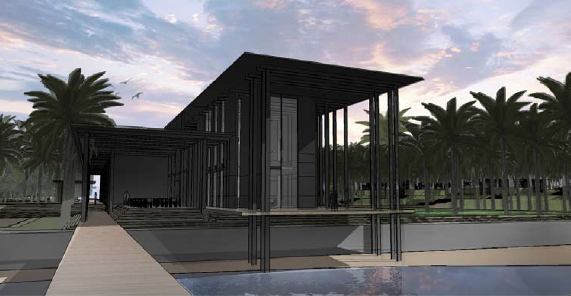Since 1993 the
Rencontres du Vietnam
, which is an official
partner of UNESCO, has
organised international scientific conferences
and schools to foster exchanges between
Vietnamese or Asia-Pacific scientists and colleagues
from other parts of the world.
The construction of the
International Centre for Interdisciplinary
Science Education
(ICISE)
in the city of Quy Nhon (Central Vietnam)
had the ambitious objective to focus on developing
Science and Education, helping young Asian students and
scientists to meet with the International Science community,
bringing the opportunity to accelerate their knowledge
from attending lectures and sharing ideas with overseas
high-level counterparts.
Three neutrinos and beyond
The first collisions in the SLC at SLAC took place on 12 April 1989 and in LEP on 13 August 1989. 2019 will thus be the 30th anniversary of the discovery that there are only three families of light active neutrinos, which was published on 12-16 October 1989. The theme of the XVèmes Rencontres du Vietnam will be centred on what we know today about these three families, what are the consequences, what physics might lie beyond, and how to access it.
The program will be articulated around several themes:
-- History of the discovery of the existence of three and only three families of active neutrinos
-- The impact of this number on astrophysics cosmology and particle physics then and now.
-- The neutrino properties and their mixing matrix
-- The search for the origin of neutrino masses and, because neutrinos are neutral unlike the other fermions of the Standard Model, the possible existence of a fermion number violating mass term (Majorana mass term) and of sterile neutrinos.
-- The searches for sterile/right-handed neutrinos in the energy scales ranging from eV to TeVs
-- eV scale or below accessible to reactor and pion decay neutrinos,
-- keV scale accessible to gamma-ray astronomy,
-- Pion mass to Higgs mass accessible to fixed target and collider experiments
-- The prospects of the three neutrino families and neutrino mass models to explain Dark Matter and the Baryon Asymmetry of the Universe, and the prospects for experimental tests.
-- Synergies between neutrino experiments and other fields, in particular dark matter searches.
Attendance to the meeting will be by invitation. Submission of abstract for contribution is strongly encouraged, leading to poster or oral presentations depending on the available time. All invited, oral or poster contributions will be invited to publication in the proceedings.
More information on the timetable, parallel sessions and poster sessions will be posted on this web site
The program will be articulated around several themes:
-- History of the discovery of the existence of three and only three families of active neutrinos
-- The impact of this number on astrophysics cosmology and particle physics then and now.
-- The neutrino properties and their mixing matrix
-- The search for the origin of neutrino masses and, because neutrinos are neutral unlike the other fermions of the Standard Model, the possible existence of a fermion number violating mass term (Majorana mass term) and of sterile neutrinos.
-- The searches for sterile/right-handed neutrinos in the energy scales ranging from eV to TeVs
-- eV scale or below accessible to reactor and pion decay neutrinos,
-- keV scale accessible to gamma-ray astronomy,
-- Pion mass to Higgs mass accessible to fixed target and collider experiments
-- The prospects of the three neutrino families and neutrino mass models to explain Dark Matter and the Baryon Asymmetry of the Universe, and the prospects for experimental tests.
-- Synergies between neutrino experiments and other fields, in particular dark matter searches.
Attendance to the meeting will be by invitation. Submission of abstract for contribution is strongly encouraged, leading to poster or oral presentations depending on the available time. All invited, oral or poster contributions will be invited to publication in the proceedings.
More information on the timetable, parallel sessions and poster sessions will be posted on this web site
Scientific Program Committee
| Alain Blondel
CERN, Geneva, Switzerland chair |
||
| Son Cao
KEK, Tsukuba, Japan |
Jacques Dumarchez
LPNHE, Paris, France |
Raj Gandhi
HCRI, Allahabad, India |
| Boris Kayser
Fermilab, Batavia, USA |
Joachim Kopp
CERN, Geneva, Switzerland |
Manfred Lindner
MPIK, Heidelberg, Germany |
| Sotiris Loucatos
Irfu-CEA-Saclay and APC, Paris, France |
Tsuyoshi Nakaya
Kyoto University, Japan |
Trân Thanh Vân
Rencontres du Vietnam Gif-sur-Yvette, France |
Contact Us
For questions regarding the scientific program contact:
| Alain Blondel
Alain.blondel@cern.ch |
|
|
| Aimie Fong Secretary of the Rencontres du Vietnam rencontres.vietnam@gmail.com BP 33 F-91192 Gif sur Yvette France Tel : 33 (0)1 69 28 51 35 |


